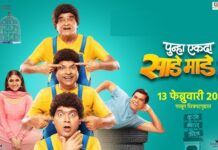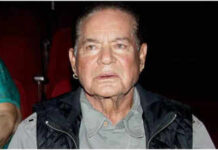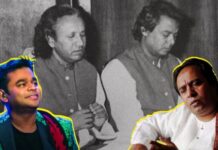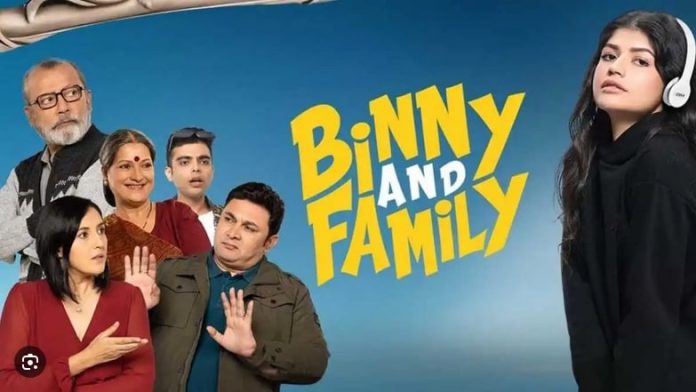Mahaveer Jain, Balaji Telefilms, Mrighdeep Singh Lamba, Shashank Khaitan, Mahaveer Jain Films and Waveband Production’s Binny And Family (UA) is the story of traditional values versus modernity.
Binny (Anjini Dhawan) lives in London with her parents, Vinay Singh (Rajesh Kumar) and Radhika Singh (Charu Shankar). Being a modern girl, attending late-night parties and drinking alcohol are normal things for her. However, she has to put on a facade each time her grandparents come from India to spend some weeks with them. This year, in particular, is tough for Binny as she has to prepare for her board examinations. After cribbing and complaining on hearing that her grandparents are scheduled to visit them, she adjusts with her grandparents who share her bedroom with her. After some days of returning to India, the grandmother falls ill. Like a very concerned son, Vinay asks his father to bring his mother to London again so that she can be given the best medical care. All hell breaks loose when Binny gets to know that the grandparents will once again be at their house. Her tantrums prompt Vinay to lie to his father that the family doctor had opined that the mother be admitted to a hospital in Patna instead of taking the risk of flying her to London. Like a truly concerned son, Vinay takes the flight to India to be with his father, mother, sister and brother-in-law. However, within days, the mother dies of cardiac failure.
Binny and her mother come to India to pay their last respects to the departed soul. Somewhere, they feel guilty about the demise. After all the ceremonies are done with in India, and after Binny and her mother have reached London, the grandfather accompanies son Vinay to London . What happens thereafter? How does Binny now react to her grandfather’s presence in their home? Do they bond well or is there tension in the family?
Sanjay Tripathy has written a nice story about the bonding between family members and about the generation gap. But the story is like a short story which does not lend itself too well to a film. His screenplay is slow and appears too stretched, especially in the first half. The pace as well as the drama pick up post-interval. Also, the second half has some truly emotional scenes which touch the viewers and would definitely move the weak-hearted to tears. But the viewers get the feeling that the writer has tried to do the balancing act — it seems, he does not want to antagonise the older generation and he doesn’t even want to get on the wrong side of the younger generation. Resultantly, the drama is neither here nor there. This is the biggest undoing of the screenplay. In a story which needs sides to be taken, the audience want the writer to underline what’s wrong and what’s not. But in this screenplay, Binny’s logic in the pre-climax, in which the grandfather is ready to return to India, does not seem justified. In particular, the view point of the youngsters may not go down too well with the audience. Another minus point is that the drama looks a bit too theatrical and also predictable after a point of time. Besides, it looks episodic in nature because in the portion of the grandfather’s return to London post the grandmother’s demise, there isn’t much shown about Binny’s parents. Likewise, in the portion when Vinay Singh reaches Patna, the writer doesn’t show much about what’s happening in London. The climax, in which the grandfather clears the air about the grandmother’s death, seems to be the easy way out and too simplistic to be true. There’s one more point which has not been taken care of in the scripting: although Binny and her mother make such a big issue about Binny’s studies and giving her her space, the writer has never shown how Binny is inconvenienced due to her grandparents sharing her room with her. In fact, the viewers often wonder whether Binny is really interested in her studies because she is mostly seen doing everything else but studying. Sanjay Tripathy and Naman Tripathy’s dialogues are fairly good but should’ve been more forceful.
Anjini Dhawan acts freely and does a fine job in her debut role as Binny. Pankaj Kapur is first-rate as Binny’s grandfather. His nuanced acting makes him a darling of the viewers. Rajesh Kumar has his moments and does justice to the character of Vinay Singh. Charu Shankar is quite nice as Radhika Singh. Himani Shivpuri lends reasonable support as the grandmother. Naman Tripathy is entertaining as Binny’s bestie, Bhavesh Parikh. Tai Khan is charming in the role of Dhruv. Ariya Larker (as Sanaya), Lydia Danistan (as Diya), Robert Griffith (as the activity coordinator), Shahab Ali Khan (as Raghav), Jyoti Pandey (as Vibha), Manju Gupta (as the widow), Sandip Challa (as the widow’s son), Rahul Tomar (as the bank clerk), Asif Rehman (as the bank manager), Deepak (as Suraj), Umesh Shukla (as Shukla), Sunil Bajpayee (as Sinha), Dr. Omendra Kumar (as Raheem), Gandhar Babre (as Dr. Ghosh) and Kumar Gaurav (as the junior doctor) provide the required support.
Sanjay Tripathy’s direction is fair. His narration is better in the second half. Lalit Pandit and Vishal Mishra’s music is okay. Of course, the need was for the film to have had hit music. Lyrics (Sanjay Tripathy and Kaushal Kishore) are meaningful. Arjuna Harjai’s background music is okay. Mohit Puri’s cinematography is neat. Production designing (by Leena Bhandula) is proper. Sourabh Prabhudesai’s editing should’ve been sharper.
On the whole, Binny And Family is a good attempt at making a message-oriented family drama but its box-office prospects are weak because of three reasons: lack of initial value, lack of novelty in the subject (one has seen such dramas as a small part of the bigger picture in several earlier films; just this drama is like a drama for a short film) and lack of face value.
Released on 27-9-’24 at Inox (daily 2 shows) and other cinemas of Bombay thru PVR Inox Pictures. Publicity: not up to the mark. Opening: poor. …….Also released all over. Opening was weak everywhere. The film has some chance on the small screen (OTT/satellite television).






























